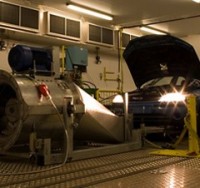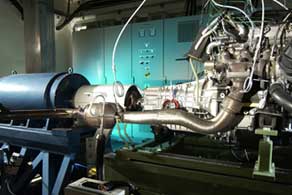Bath University is to develop a world-class research facility for low-emission vehicles following the award of funding worth £3.2m.
The centre, which will lead research into alternative fuels, electric and hybrid electric vehicles, will be the only one of its kind in the UK.
The investment, from a number of sources including the university itself, will place its Department of Mechanical Engineering at the heart of global research into pioneering low-carbon passenger vehicles.
The university’s long-established Powertrain and Vehicle Research Centre (PVRC), which has worked with some of the world’s top car manufacturers, will become the Centre for Low Emission Vehicle Research (CLEVeR) and lead the international drive towards green motoring.
The centre will acting as a ‘centre of gravity’ for the academics and the automotive industry to forge new national and international research collaborations. These will address a number of critical research questions surrounding future low carbon passenger vehicles
Some £2m of the funding is coming from the Engineering & Physical Sciences Research Funding to set up CLEVeR) with £600,000 being injected by the university to establish the centre as a platform where fundamental academic research can be undertaken alongside applied investigations in a world class vehicle research facility.
It will address many of the future research challenges associated with current and future low and ultra-low carbon vehicles under real world driving conditions.
Prof Gary Hawley, the lead investigator, said: “The current vehicle facility has served our research needs well for the past decade and we have undertaken ground breaking work for a host of companies including Ford and Jaguar Land Rover. The upgraded facility will see research capability open up in the area of future fuels, electric and hybrid electric vehicles and their sub-systems and will be the only one of its type in the UK.”
Additional investigators are Dr Chris Brace, Dr Sam Akehurst and Dr Sam Bannister.
Following the Powertrain and Vehicle Research Centre’s successful work with the Technology Strategy Board’s SB Low Carbon Vehicles Integrated Delivery Program, it has also secured £257,000 in a collaborative project led by HiETA Technologies, a company based at the Bristol & Bath Science Park and a pioneer in 3D printing and ‘additive manufacturing’ for the automotive sector. Additive manufacturing 'grows' parts by laying down material, usually in successive layers from the bottom up rather than machining away material or using dies and moulds. 
In addition, Dr Chris Brace and Dr Sam Akehurst have also secured £874,000 of funding in a collaborative project with Ashwoods Automotive TATA Motors European Technical Centre (TMETC) at Warwick University.
Jane Millar, Pro-Vice-Chancellor for Research, said: “Congratulations to Professor Hawley and colleagues in the Powertrain and Vehicle Research Centre. These awards are clear recognition of the quality of their research. This sort of co-funding, the University working with external partners to invest in research infrastructure, is essential for future success. I look forward to seeing CLEVeR develop.”
Areas the PVRC has led research in include:
- Clean, low-carbon combustion engines
- Low-carbon powertrain optimisation
- Energy-efficient transmissions
- Turbocharging
- Alternative fuels
- Improving driver behaviour for reduced fuel consumption
- Precision measurement of both engine and vehicle CO2
- Thermal management of engine and powertrain system for enhanced efficiency
- Hybrid vehicle and electric motor research – investigating next generation cost-effective hybrid vehicle architectures



















